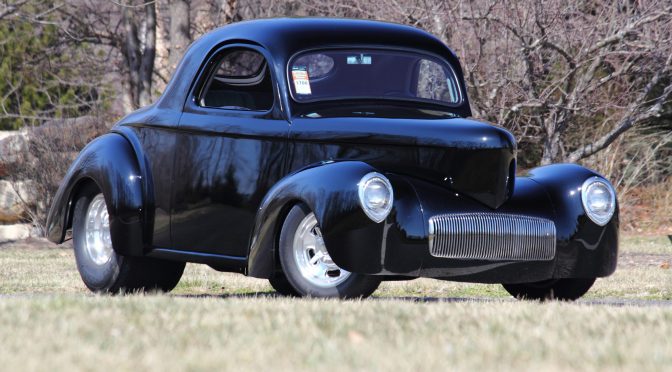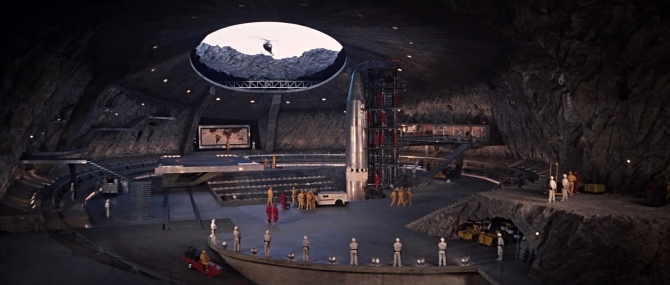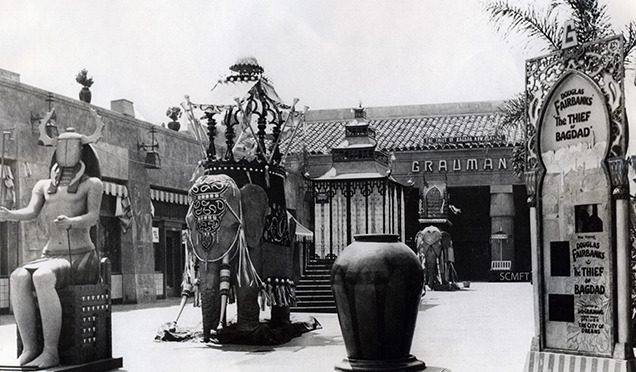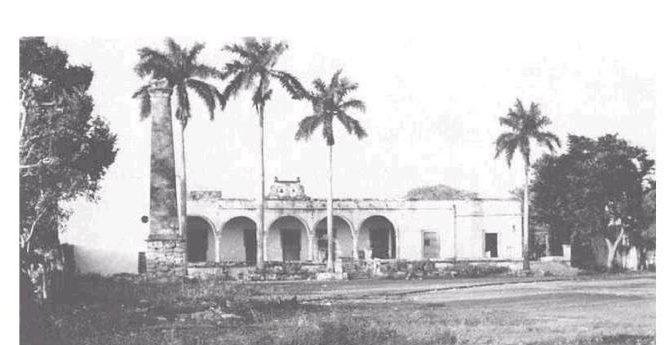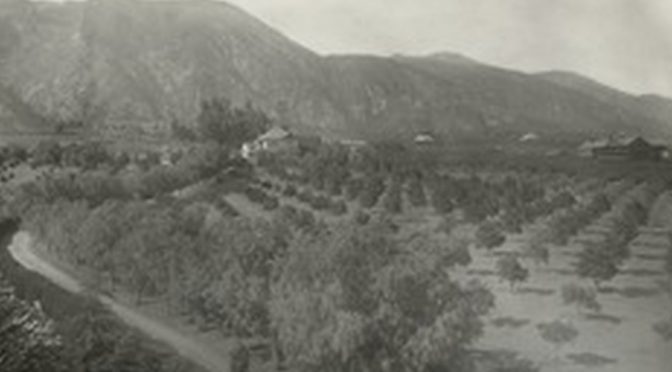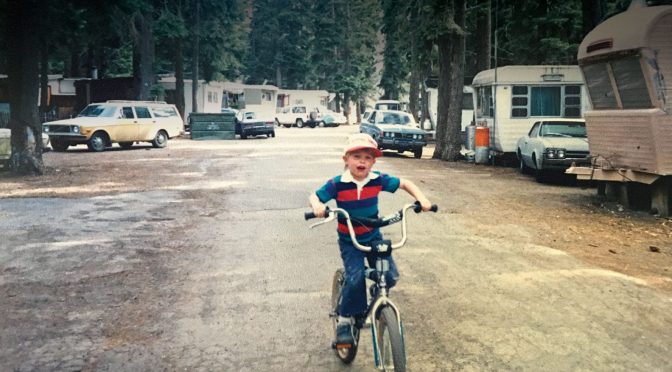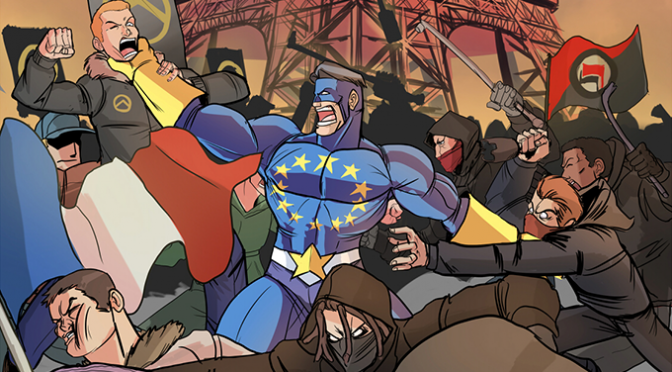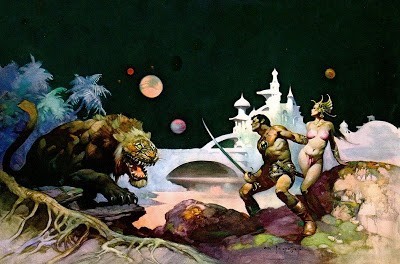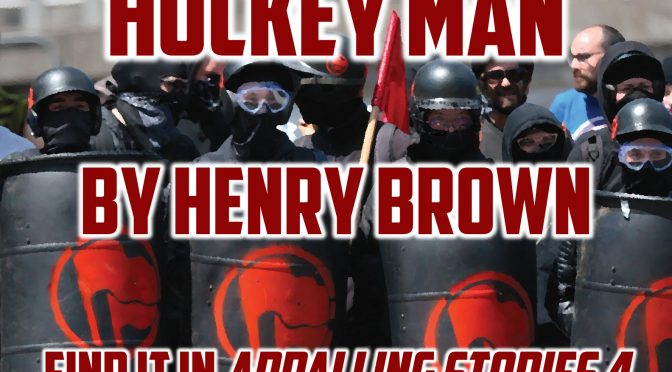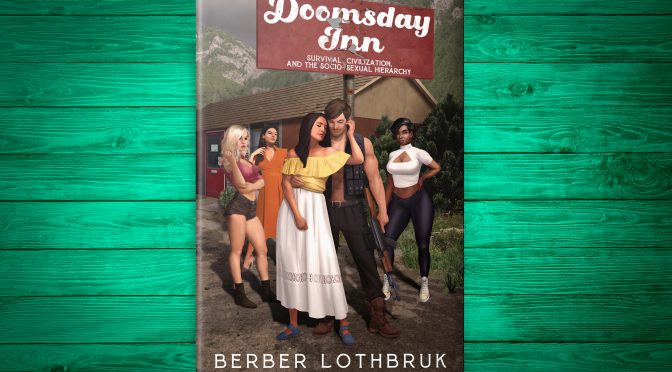I organized the belongings I had collected since that first day at the Orange Grove—except for the fancy shoes and custom suit from Mami. I didn’t have that much, yet, so I easily packed it all in a very old suitcase Uncle Si gave me—made out of something like cardboard covered with wallpaper, lined with something silky on the inside. I asked if I could take some of the adventure magazines (“pulps” he called them) with me, and permission was granted.
Uncle Si packed whatever he was taking in a similar suitcase, and we met at one of the hangars, dressed in duds from the wardrobe. This time, my clothes fit me pretty well.
Inside the hangar, he opened the trunk of a strange-looking old car, and put our luggage in it. This automobile had the same flowing, rounded contours of the cars at the Orange Grove, but it wasn’t as low-slung or long and sleek. I asked him what it was and he said, “The body is based on a ’41 Willys.”
I had never bothered to memorize anything about cars before. Just like my interest in football began with a few pictures and stories, my interest in automotive machinery began with passenger experiences in a few special vehicles from Uncle Si’s collection.
Our first stop was the Orange Grove to spend the weekend with Mami. I was anxious to get started on the vacation, but I missed her and was happy to see her again. She seemed delighted to see us as well, as usual. She tested me to see if I’d kept up on the Spanish she’d been teaching me. Then, using both languages as needed, she asked me how I was doing in general, if I was excited about our pending road trip, and so on.
She slept in late with my uncle again, both days. After waking early the first day and finding the kitchen empty, I wandered by the master bedroom, looking for her. I heard her voice from inside. At first I thought she was in pain of some kind—she moaned and wailed and made what sounded like pleas for mercy. I was afraid somebody had broken into the house and was torturing her. But just as I was about to try forcing the lock and breaking in, she calmed down. Her cries mellowed out. She sighed and whispered. She sounded happy. I couldn’t make out the words, but I recognized the breathless tones and inflections as of an extremely affectionate nature. And a couple times she spoke my uncle’s name.
She pronounced it “sigh-moan,” which I found ironic after all the sighing and moaning she’d done.
I certainly didn’t understand sex yet, but I’d heard enough and seen enough in the movies to figure out what was up.
The next morning I read some “Black Bat” stories in my room until I heard voices and movement from the kitchen. I figured it was safe to come out, then.
Over breakfast, Uncle Si looked uncomfortable when he told me, “Because of the risks involved by interacting with regular people, we have to make some changes. I’ll let you know about those as we go, but there’s one starting now; and we’ll have to practice it during this vacation.”
I paused from chewing my food and paid close attention.
“When we went back to see the Sullivan-Corbett fight, we went as father and son,” he said, with a blank face. “Well, that’s gonna be permanent, starting now. Don’t call me ‘uncle,’ and don’t even think of me as your uncle. Start thinking of me as your father. Then you’ll be less likely to slip up in conversation and arouse somebody’s suspicion.”
“Suspicion of what?” I asked, doubting many people could guess that my uncle was an international supervillain who traveled with his nephew through time and space.
“Of anything. We want to seem as normal and unremarkable as possible to anybody we encounter. A boy who has no parents, adopted by his bachelor uncle is not normal. You also have to be cognizant of where and when we are at all times. Don’t talk about Madonna or Mike Tyson or Dodge Vipers, if we’re in, say, the 1970s. Don’t say anything about Vietnam in the 1950s. Don’t mention Pearl Harbor in the time we’re in right now. Savvy?”
“I savvy.”
“Your name is gonna change, too,” he added. “Both of ours. I’m still working on that. For now, go by your first name, only. If there’s a situation where we have to state a last name, for now it’s ‘Harris’.”
“Well, it’s already an improvement over Bedauern,” I said. He nodded agreement.
From that moment forward, I had a dad.
When Mami cleared the table and went to the sink to wash dishes, I asked Dad, “What about her? A kid with a father but no mother is unusual, ain’t it?”
“It is. So when we’re out and about, Mom is simply ‘back at the house’ if anybody asks. If we’re actually at one of my houses, then whichever woman I have living there is ‘Mom,’ so far as anybody else is concerned.”
This made me wonder how many women, like Carmen, he had. But I didn’t feel comfortable asking about it.
***
We took the ’41 Willys back to 1947, and began a tour of the USA—something Uncle…Dad said he’d wanted to do for a long time. We visited Valley Forge, Concorde Bridge, Gettysburg, Kittyhawk, Mount Rushmore, the badlands, the site of the Little Bighorn battle, parts of the Oregon Trail where wagon ruts were still visible in the hardened mud, what was left of Dodge City and Tombstone, Yellowstone, the Redwood Forest, Hollywood again, and all sorts of places in between.
One aspect of 1947 I noticed that was consistent regardless of where we went, was that everyone seemed to be happy. Dad explained that this generation was optimistic by nature, and what he called “pop culture” (music, movies, magazines, etc.) encouraged their optimism. Nobody (outside of college professors, he speculated) openly bad-mouthed America like everyone did at the coordinates I came from. All the movies, music, TV shows, celebrities, teachers, and audiences of all the above from my old world hated America, and anybody who dared suggest America wasn’t horrible. These people in 1947 were proud to be Americans, and grateful to be living in the USA. Furthermore, they had just come through a Depression and a World War. Their lives had all gotten much better two years ago, and the peace and unprecedented prosperity they saw unfolding in the country was assumed to be unstoppable. Nobody suspected anyone would want to stop it—why should they?
That ’41 Willys was some car. Dad once confided in me, “There is nothing factory-stock on this entire car. Nothing. I built it from the ground-up with all the best parts I could find from the 1980s, ’90s, and beyond. I don’t let anybody look under the hood or snoop around underneath it.”
There were plenty of places in 1947 with no posted speed limits, and he opened it up on those stretches. He couldn’t quite let it all hang out like he had when we visited the Bonneville Salt Flats, because the quality of the roads usually wasn’t good enough. But that hot rod seemed faster than a speeding bullet. After one such jaunt, while buying gas at a service station, a police car approached from the direction we’d come, siren blaring and beacon shining.
The light on this police car was so different from what I was used to, it piqued my interest. It was like a round floodlight, only mounted horizontally, facing the front, and the red lens spun.
Anyway, I assumed the cop would race past us on his way to whatever, but instead, he pulled into the service station, parked nose-to-nose with the Willys, and got out to confront Dad, who was returning from the restroom.
“Do you know how fast you were going back there?” the cop asked.
“About 180,” Dad replied, simply. I knew he didn’t like cops, but his demeanor was pretty friendly.
“Nobody likes a wise guy,” the cop said, frowning. “No car can go that fast.”
“How fast will yours go?” Dad asked, conversationally.
The cop seemed to lighten up a bit as he patted the hood of his patrol car. “I’ve got her up to 110 on a long downhill stretch before. This engine has got power like…” He sobered up again, somewhat. “But you left me in the dust back there. I had it floored, and you were still losing me.”
He began walking around the Willys, and Dad visibly stiffened.
“Where in the world did you get tires like these?”
“Custom made,” Dad said.
The cop made his way around to the driver side and peered through the open window, whistling. “I’ve never seen a speedometer that read so high. Most of them don’t even go up to 100.”
He turned back to Dad with a look of bewilderment. Dad extended his hand, “Simon Harris. I’m an engineer at the Automotive Division of Planetary Future Technologies. I’m testing out some of the equipment we might be using in a prototype to be unveiled at the next Automobile Expo.”
The cop shook his hand. “Jumpin’ catfish, fellah. They let you play with these gizmos a lot?”
“I play with these, and a lot more,” Dad said.
“And you get paid for it, to boot?” He whistled again, then ran his hand over the smooth, glossy surface of the Willys body. “Why did you stuff all the new features inside a pre-war model car?”
Dad shrugged. “Let’s me test it out on public roads while still remaining incognito…except when it comes to sharp eyes like yours. No use letting the whole world, and the competition, see everything we’re working on.”
“No, I guess not, at that,” the cop said.
He began asking technical questions. I don’t know how honest Dad was with him, but he had answers for everything that evidently impressed the cop. Afterwards, Officer Bob Frey shook his hand again and, almost apologetically, said, “We don’t get that many scientific engineers comin’ through here in futuristic vehicles. And even though there’s no posted speed limit, I still have to get folks to slow down when it strikes me that their speed is unsafe. If you still need to test this thing out around here, your best bet is take it out to Bonny Lass Road. Nobody should bother you out there.”
Dad thanked him, they shook hands again, and we drove off our separate ways. Officer Frey no doubt went off to meet some fellow cops and tell them a story over coffee and doughnuts that would eventually become an “urban legend.” We drove off to find Bonny Lass Road, of course.
“Cops sure are different now, too,” I observed out loud.
Dad nodded. “Once upon a time, decent men became cops. They wanted justice and to actually help people. Obviously, something changed. Maybe it was all the jingoistic cop movies and cop shows—I dunno. But it became just a way for would-be Hitler Youth to get their sick jollies pushing people around and hiding behind a badge.”
Aside from the conveniences of advancing technology, everything was better in the past, it seemed.
***
I had an even higher opinion of Dad during and after the vacation than when it began. We talked about anything and everything that interested me: sports; music; gadgets; even the pulp stories I’d been reading. He had knowledge in every subject that intrigued me, and either shared my interest, or could remember back to when he had. We didn’t watch a single television show the entire time (TV was pretty new in 1947, fairly crude and expensive, and only some people even had it) and yet I was thoroughly entertained the entire time.
I noticed now and then that he occasionally limped, and often massaged his knees when sitting. I asked him about it and he mumbled something about parachuting, but never answered in detail. However, that did lead to what would prove one of his many lectures about health. He went over good habits vs. bad habits, and how they would affect my knees and back. He also warned me to never starve myself for any reason. While I should never be gluttonous, I should also never reduce the amount of food I ate to below what my body wanted. There was no need to, he told me, because he had kitchens throughout space and time, well-stocked, with competent cooks, and I’d always be welcome to eat three squares a day, free of charge, even after I was old enough to make my own way.
We stayed in hotels and motels periodically, taking advantage of the showers (and swimming pools, in some cases), but mostly camped out, with a tent and sleeping bags. The smell of pine trees, and smoke from campfires, would forever cast my memory back to that fantastic vacation, no matter how old I got.
More than once, when we went swimming at a lake, the ocean, or in a hotel swimming pool, people would notice the scar tissue all over Dad’s back. It soon became obvious who had fought in the war and who hadn’t, not just by their age or physical condition, but by how they reacted to Dad’s wound. Those who hadn’t served would invariably ask, “Did you get that in the war?” Veterans would either simply ask, “Where’d you get that?” or ignore it, at least initially, and maybe get around to probing the issue later.
We ran into veterans vacationing with their families (nearly every man over the age of 21 was a veteran in 1947), and I managed to make friends with their kids. We would swim and play while the grown-ups talked.
New friendships are always exciting. Plus, when the other kids were younger than me, I became the default leader—so it was a sort of leadership practice, and I learned a little about group dynamics.
I never paid attention to an entire conversation Dad would have with the other adults, but I caught fragments. Dad mostly asked questions and kept the other folks talking about their own experiences. But he evidently had a cover story set for how he got burned; and (as I came to appreciate later on) he knew a lot about World War II—more than enough to make his cover story sound plausible.
When we camped out, often we just pulled off the main road, followed an unpaved path to a suitable spot, and pitched the tent. Out West there were vast areas of public land; so we made use of it. We did find this one purpose-made campground, though. We got the tent set up and the fire ready to light by about an hour before dusk.
The place had public restrooms with running water in sinks—quite the ritzy setup for the time. Dad let me take a stroll up to these centrally-located facilities by myself. In one of our many conversations, Dad revealed that women or children were safe to walk alone at night pretty much anywhere in the country (excepting cesspools like Chicago and New York City, of course) up until maybe the 1970s.
After relieving myself and washing up, I took a stroll through the campgrounds, mostly just observing the natural scenery, and the many different families, their cars, and their shiny silver camp trailers.
When I came to an area with unoccupied campsites, I figured the secluded area would be safe to try something I’d had an urge to do ever since watching Tarzan and His Mate. I pounded both fists against my chest and, at the top of my lungs, bellowed my best impression of Johnny Weissmuller’s ape-man yodel. It didn’t sound as good as I imagined it would, even to my own ears. But still, it was kind of fun. With my upbringing, I had learned to amuse myself to fend off boredom…and sometimes I could do it via quite unsophisticated means.
By the time I found my way back to our campsite, there was a family of new arrivals at the next site over. The man from that group was talking to Dad while the man’s wife set up some cooking implements, and a pretty girl about my age looked on.
Dad looked away from the man briefly, noticing my arrival. He must have heard the Tarzan yodel, as sound carried so far at night there. In retrospect, I realize he almost certainly knew it was me who did it, too. But he never mentioned it. I was so sure I was doing something brave and rebellious with that ape-man imitation, but of course it was just silly kid stuff—tame (or lame, depending on perspective) by the standards of my original generation.
After the men’s conversation went on for several minutes, Dad introduced me in passing. The man nodded; his wife smiled and bid me hello; the pretty daughter mumbled hello with an expression I would, years later, come to recognize as the Female Glare of Guarded Evaluation, or FGGE. At the time it looked like disgust or hostility, so I turned away and prepared to light our fire.
The family’s name was Benake. They were from Oakland. The hostile pretty girl’s name was Gloria. She was blonde, but darker blonde than her mother.
Before I lit the match, Mrs. Benake called out to her Husband. “Honey, why don’t you invite our neighbors over, instead of standing there talking over the bushes all night?”
“Well, I guess she’s got a point, at that,” Mr. Benake told Dad. “Why don’t you and your boy come on over and eat with us? We brought more food than just the three of us can eat, to be frank. We even have marshmallows to roast for dessert.”
“Thank you,” Dad said. “That sounds fine.”
Mrs. Benake seemed pleased as she looked at me. “Peter, would you help Gloria fetch some water from the public washroom, so I can boil the corn?”
I glanced between Dad and her. Dad nodded, slightly.
“Sure,” I said. “What should I pour it in?”
Gloria spoke, holding up a big metal pail by its handle. “I’ve got it right here.”
I didn’t have much interest in spending time with somebody who took an instant dislike to me, so I said, “I can get it by myself, if you like.”
Both Gloria and her mother shook their heads.
“It’s heavy when it’s full,” Gloria said. “You’ll see.”
Her countenance had changed to a more friendly, welcoming configuration since our initial sighting of each other, so I shrugged and agreed.
Once I was beside her, she said, “I’m not sure where the public bathrooms are.”
“I know how to get there,” I told her, with all the pride of a frontier scout informing tenderfoot pilgrims on a wagon train that I could guide them safely through Indian Country.
“Alright. I’ll go where you go, then.”
It’s rather pathetic how the male of the species turns to mush when an attractive female does something as mundane as smile and/or utter an innocent statement like that. But her assurance to go wherever I went triggered something in the fantasy-generating segment of my imagination which went far beyond a trip to fetch water. And this was technically before I had developed an interest in girls.
She carried the pail as we went, complaining, “Every time we go camping, I have to haul the stupid water. Makes me wish we would just roast weenies or something.”
Her opening up like this struck me as an improvement over the hostile glare from earlier. “I’m surprised you can carry it at all, by yourself, when it’s full.”
“I can’t,” she admitted. “Dad has to help me. But still, I’m probably going to get callouses from this handle.”
“I’ll take it,” I said, holding my hand out.
“Oh, thank-you.”
She handed me the bucket.
“You’ll probably need my help once it’s full, though—even though boys are stronger; I know.”
I turned to study her as we walked. This was a surprising admission from her. In my world all the movies, TV shows and literature portrayed females as superior to males in every way—including physical strength. And girls from my generation seemed to believe the message.
“Especially now,” she went on. “It seems all the boys from my class are getting taller and stronger every day.” Something strange happened to her voice as she said this. “Sultry” might be a good description of her tone right then, though my vocabulary wasn’t advanced enough to have chosen that word at the time.
She asked my age, and I, in turn, asked hers. She was a couple months younger.
She asked a lot of questions and got me talking about myself—just as Dad was able to do with the average grown-up. This was new territory for me. I didn’t normally open up about myself—even without all the secrets I now needed to keep. But she coaxed me into chattering away as if I was outgoing. I was careful to stick to the cover story, but that still left room for plenty of honest revelations, and I was flattered by the attention.
We filled the bucket, outside the building, from a spigot that appeared to be there for that very purpose. The full pail was indeed heavy, I found out, as we lifted it together. The weight of it made the handle bite into my hand. She had to stop and rest before we made it 30 yards; and again before we made it 20 more yards. The next time she had to stop I changed my grip and picked it up by myself. I had to lean away from it, compensating for the weight, and it was awkward to carry it without spilling the water.
“You don’t have to do that,” she protested. “I can help.”
I made it about 80 yards and had to set it down. I shook my hurting hand and prepared to lift it with my other arm, but she reached toward me and said, “let me see that.”
She took hold of my hand and pulled it toward her. “Oh, my,” she said, examining the sharp red indentation across my palm, in the diminishing light. “You are stubborn, aren’t you?”
I was absorbed in the contrast of her hands to mine. Hers were small, clean, soft works of art, with long fingernails. Her touch was a pleasant sensation. She flattened one of her delicate hands out, so those fingernails wouldn’t scratch me, and rubbed her velvety fingertips over the sore impression the bucket handle had left in my skin. I don’t know how effective her technique was, medically, but I forgot all about the pain.
“You’ve already got callouses,” she said. “What are those from?”
“Monkey bars,” I said. As part of my daily training, I had to go down and back a line of monkey bars in the gym at BH Station. It had caused blisters the first few times I did it. Those blisters ruptured as I continued. Later on, the skin toughened up.
We carried the pail together the rest of the way, and the next time she had to stop and rest, she showed me the red indentation in her own hand. This was probably an invitation to return the favor she’d done me, but I assumed it was my own genius idea.
Her touch was nice. Touching her back was nice, too. Even better was the way she accepted my touch.
We were chattering away when we returned to her parents’ campsite. The parents exchanged looks and Mrs. Benake said, “You two look like old friends already. Bring the water over here, please.”
In the midst of the fire were a couple flat-topped rocks. Mrs. Benake set a large pot on those rocks so that the flames licked all around and underneath it, and poured water from the pail into it. Then she dumped several corn cobs in the water. Mr. Benake said he’d gone pheasant hunting yesterday, and proved it by producing four gutted-and-plucked birds to roast by spit over that fire.
Gloria helped her mother for a while. I sat on a stump and stared off into the woods, forcing myself not to stare at Gloria. To my delight, when she came to sit down awaiting supper, she set up her folding chair next to me.
We continued to talk, and I was enamored. I remember Dad once mentioning that you should never stare right into a fire at night, or it would screw up your “night vision.” So I watched Gloria, who did stare right into the fire, for the most part. The firelight made her look even better.
She mentioned a lot of different music she liked, and various musicians. I’d never heard of any of them, so I mostly just nodded and listened. She asked me which songs and musicians I liked. Thinking fast, I coughed up some artists and titles I’d heard on the radio at the Orange Grove. Her eyes widened and nostrils flared after hearing me recite a few. “Those are so old!” she cried.
I shrugged. “My mom likes them. I’m not normally good with remembering the names, except for some of her favorites, ’cause I hear them so much.”
“Where is your mom?” she asked. “Why didn’t she come with you?”
“She’s back at the house. This is a father-son deal,” I said. “He’s busy a lot, so I don’t get to see him as much as the…as her. This is our time together.”
“That’s neat. Your dad seems like a great guy.”
I nodded.
When the food was ready, Mrs. Benake passed out dishes and utensils. But before we ate, Mr. Benake asked everyone to bow our heads. He spoke a short prayer, giving God thanks for the meal, thanking Him for the good company (meaning us, I deduced) and asking blessings on this, that, and the other. I hadn’t heard anything quite like it, and was fairly unacquainted with this custom anyway.
We ate, and roasted marshmallows afterwards. The food was good, but the company was better.
When I finally did drift off to sleep that night, it was contented sleep with pleasant dreams. The next day the Benake family packed up and left after lunch. Before that, Gloria and I went for a walk by ourselves. She touched me a lot when she talked that day, and we wound up holding hands on the way back to the site. Before they left, she wrote her mailing address on some notebook paper and gave it to me, asking me to write and come visit her someday if I could.
The immediate postwar years had really impressed me, and meeting Gloria was the icing on the cake.
UPDATE: This book is published! Click here to buy on Amazon.
Click here to buy anywhere else.

